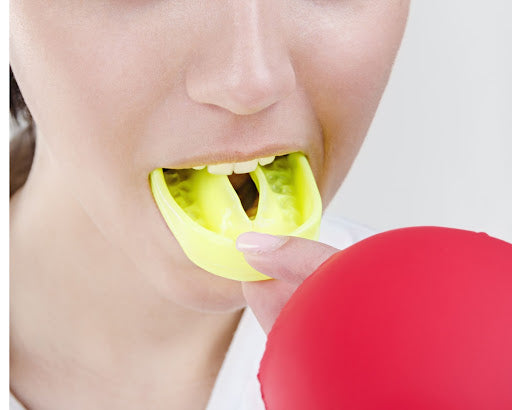Sleep apnea is a sleep disorder that causes the patient’s breathing to start and stop repeatedly throughout the night. These cessations in breathing can last anywhere from a few seconds to a few minutes and occur when the individual’s soft palate collapses and blocks their airway. As a result, people often choke or gasp for air during their sleep, attempting to reopen their airway — all unbeknownst to them.
Although the patient with sleep apnea will stop breathing throughout the night, they typically don’t know it is happening. Sleep apnea symptoms are often noticed by a significant other or family member who witnesses the patient snoring, choking, or gasping for air. Because of the disruptions to their sleep, the individual often feels fatigued and unrested as they go about their day, even if they received a full eight hours of sleep.
Obstructive sleep apnea can be diagnosed by a doctor, dentist, or sleep specialist, often through a physical exam, as well as a sleep study. Individuals diagnosed with sleep apnea must seek treatment for their condition, ranging from lifestyle adjustments to breathing equipment to mouthguards. ApneaMed is here to walk you through how mouthguards can be used to treat more mild cases of sleep apnea.
How Does a Mouthguard Treat Sleep Apnea?
When a patient has a more mild case of sleep apnea, it may be more beneficial for them to try an alternative treatment method instead of continuous positive airway pressure therapy. A common choice is a mouthguard, also referred to as an oral appliance. This device is worn by the individual throughout the night while they sleep to promote better jaw positioning. As a result, the patient’s airway is increased and there is less chance of their airway becoming blocked.
Mouthguards for sleep apnea are not a one-size-fits-all solution. Instead, it should be custom fit by a dentist to ensure that it’s properly placed in the mouth to provide the best results. If the oral appliance is improperly fit to the mouth, not only will it do nothing for the individual’s sleep apnea, but can cause jaw pain or movement of the teeth. When using a mouthguard to treat sleep apnea, it is recommended that the patient follows up with the prescribing dentist every six months to a year to ensure proper fit and make any necessary adjustments.
Types of Oral Appliances Used for Sleep Apnea
Depending on your patient’s individual needs, various oral appliances can be recommended to them. The severity of their sleep apnea will determine which is the best option to move forward with. The types of mouthguards used to treat sleep apnea are:
- Mandibular Advancement Devices – This oral appliance is made of hard plastic custom-fit to the patient’s mouth. Like a retainer, it snaps onto the upper and lower teeth to push their jaw forward and open their airway.
- Tongue-Retaining Devices – When the patient’s sleep apnea is caused by their tongue falling into the back of their throat, a tongue-retaining device might be the best course of action to prevent the tongue from slipping back and blocking the airway.
When Is a Mouthguard Recommended Over CPAP Therapy?
The most common form of sleep apnea treatment is continuous positive airway pressure (CPAP) therapy. However, your patient may be interested in trying a mouthguard first. While oral appliances are an effective way to reduce sleep apnea symptoms, they work best in situations where the patient has:
- Mild to moderate throat collapse issues
- Weak reflex response of throat muscles
If the patient suffers from severe obstructive sleep apnea, a mouthguard will not provide them with the relief they are looking for, and they should consider CPAP therapy.
Testing and Treatment for Obstructive Sleep Apnea
If you suspect you have sleep apnea, a sleep specialist can help you navigate the process of testing for sleep apnea and determining the best treatment plan. If the sleep study concludes that you have sleep apnea, your physician can recommend a mouthguard or CPAP therapy, depending on your condition’s severity.
If you’re interested in learning more about the different sleep apnea treatment options, contact ApneaMed today.

